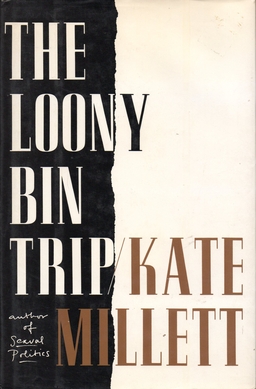The Loony-Bin Trip
The Loony-Bin Trip is a memoir written by Kate Millett, an influential figure in the feminist movement and a renowned author, artist, and activist. Published in 1990, the book details Millett's experiences with the mental health system and her involuntary commitment to a psychiatric hospital. The memoir is a critical examination of the psychiatric industry and its treatment of patients, particularly women, during the late 20th century. Millett's narrative combines personal reflection with a broader critique of societal attitudes towards mental illness and the stigmatization of those who suffer from it.
Synopsis[edit | edit source]
The Loony-Bin Trip recounts Millett's journey through the mental health system after being diagnosed with bipolar disorder. The memoir provides an intimate look at her struggles with the diagnosis, the impact of psychiatric treatment on her life, and her fight against involuntary commitment. Millett describes her experiences with powerful psychotropic medication, the often dehumanizing treatment by healthcare professionals, and the challenges of maintaining her autonomy and identity in the face of overwhelming institutional power.
Themes[edit | edit source]
The book explores several key themes, including the intersection of gender, power, and mental health; the question of sanity and who gets to define it; and the resistance against oppressive systems. Millett's work is notable for its feminist critique of psychiatry, arguing that the discipline has historically pathologized women's experiences and emotions. She also discusses the broader implications of labeling individuals as "mad" and the ways in which such labels can be used to control and marginalize dissenting voices.
Impact and Reception[edit | edit source]
Upon its release, The Loony-Bin Trip generated considerable discussion and debate. Critics praised Millett's candid and poignant narrative, while some in the psychiatric community disputed her portrayal of mental health care. The memoir has been recognized for its contribution to the discourse on mental health, feminism, and the rights of psychiatric patients. It has also been credited with helping to foster a greater understanding of the subjective nature of mental illness and the importance of treating patients with dignity and respect.
See Also[edit | edit source]
- Feminism and Psychiatry
- History of Mental Health
- Autobiography in Literature
- Patient Rights in Psychiatry
This article is a literature-related stub. You can help WikiMD by expanding it!
Search WikiMD
Ad.Tired of being Overweight? Try W8MD's physician weight loss program.
Semaglutide (Ozempic / Wegovy and Tirzepatide (Mounjaro / Zepbound) available.
Advertise on WikiMD
|
WikiMD's Wellness Encyclopedia |
| Let Food Be Thy Medicine Medicine Thy Food - Hippocrates |
Translate this page: - East Asian
中文,
日本,
한국어,
South Asian
हिन्दी,
தமிழ்,
తెలుగు,
Urdu,
ಕನ್ನಡ,
Southeast Asian
Indonesian,
Vietnamese,
Thai,
မြန်မာဘာသာ,
বাংলা
European
español,
Deutsch,
français,
Greek,
português do Brasil,
polski,
română,
русский,
Nederlands,
norsk,
svenska,
suomi,
Italian
Middle Eastern & African
عربى,
Turkish,
Persian,
Hebrew,
Afrikaans,
isiZulu,
Kiswahili,
Other
Bulgarian,
Hungarian,
Czech,
Swedish,
മലയാളം,
मराठी,
ਪੰਜਾਬੀ,
ગુજરાતી,
Portuguese,
Ukrainian
Medical Disclaimer: WikiMD is not a substitute for professional medical advice. The information on WikiMD is provided as an information resource only, may be incorrect, outdated or misleading, and is not to be used or relied on for any diagnostic or treatment purposes. Please consult your health care provider before making any healthcare decisions or for guidance about a specific medical condition. WikiMD expressly disclaims responsibility, and shall have no liability, for any damages, loss, injury, or liability whatsoever suffered as a result of your reliance on the information contained in this site. By visiting this site you agree to the foregoing terms and conditions, which may from time to time be changed or supplemented by WikiMD. If you do not agree to the foregoing terms and conditions, you should not enter or use this site. See full disclaimer.
Credits:Most images are courtesy of Wikimedia commons, and templates Wikipedia, licensed under CC BY SA or similar.
Contributors: Prab R. Tumpati, MD

